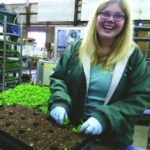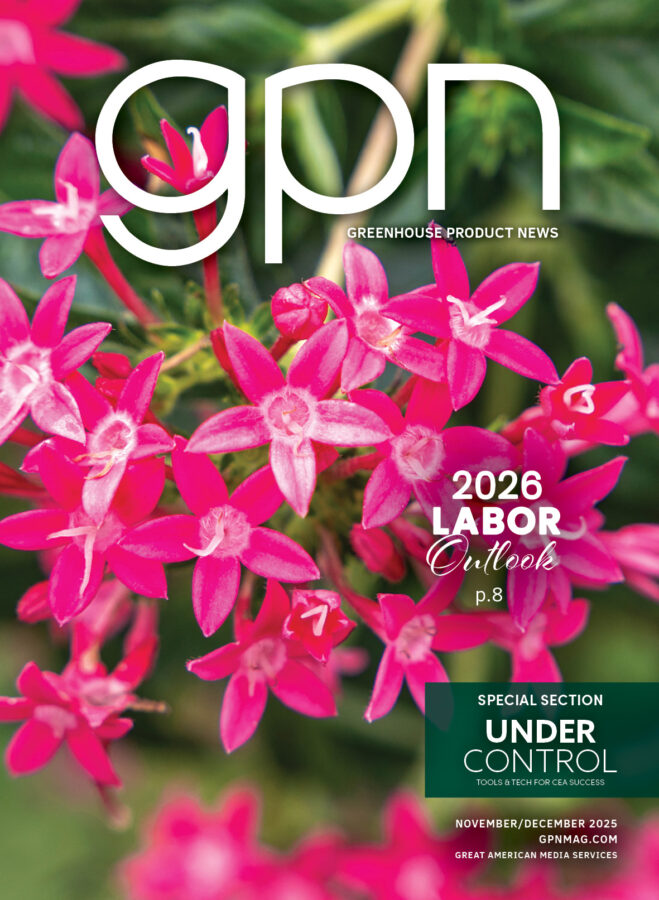
Learning The Financial Way — Scott Stiles 2006
Far from his comfort zone, this year’s winner took an internship with a financial organization and came out the winner of the 7th Annual GPN/Nexus Intern Scholarship.
Knowing the culture requirements for a limited number of crops used to be all you needed to succeed in the greenhouse industry. Times have definitely changed; now, not only do you need to be a production expert, you need to be a businessperson as well.
The 2005 GPN/Nexus Intern Scholarship winner recognized he needed a fuller education. After growing up in the industry, Scott Stiles, with the help of his Michigan State University academic adviser Bridget Behe, decided to tap into the business side of the industry and complete an internship at the Schoolcraft branch of GreenStone Farm Credit Services, an agriculture lender in Michigan and Northeast Wisconsin. “I approached this internship as a way to expand my learning outside the classroom,” Stiles said, “to gain as much knowledge in an area where I feel I need to improve. This internship placed me outside of my comfort zone but helped provide me with some of the tools I will need down the road.”
The Early Years
At an early age, Stiles began learning about the greenhouse industry from his parents Tim (who is now president of Masterpiece Flower Company and Henry Mast Greenhouses) and Lana Stiles. When Stiles was six years old his mother opened a small retail greenhouse in Mattawan, Mich. At age 11 he and his brother, with limited help from their parents, successfully grew and sold approximately 2,500 8-inch garden mums. “This experience taught me more than just the basics of growing plants,” Stiles said. “It gave me my first real responsibility for others and myself. I learned about the cost of production, profitability and the culture of a crop.”
Stiles’ ambition continued during high school; he helped in the family’s greenhouse and continued to grow garden mum crops. Through this he saved enough money to purchase his first vehicle, which would wind up being important in his understanding of the financial world. “During my senior year of high school I took on the complete management of this greenhouse, at which time I began to grasp how much capital it takes to finance a horticulture business,” Stiles said. “It really hit home when I went to our local bank to finance the operating costs of the greenhouse and had to pledge my truck, which I had saved for five years to buy, as collateral for a small operating loan.”
College Life
Stiles always knew he wanted to be a Michigan State Spartan and wanted to play basketball there, “but I think my basketball skills fell a little short,” he joked. So when it was time to choose a college he decided to go to Aquinas College, Grand Rapids, Mich., where he was able to play soccer and basketball on scholarships.
But the desire to grow plants and learn more about the greenhouse business was still important, so he located some quonsets in nearby Byron Center, Mich., that were vacant, and he negotiated a rental arrangement with the owner. Stiles began his own greenhouse, ArborView Greenhouse, selling to landscapers in the area and some grocers in the Lansing and Grand Rapids areas. Yet, Stiles still wanted more; he transferred to Michigan State University as a junior and began his quest for a floriculture degree.
When Stiles was fitted to an adviser at Michigan State he expressed his interest in marketing. So, it seemed appropriate to assign him to Bridget Behe, a professor of horticulture at Michigan State University who has conducted extensive research on horticultural marketing, business management and demographics. Behe confirmed Stiles’ choices, “He is a mature student for his age and is very interested in the business dimensions of the horticulture industry,” she said.
Often, internships, which are required for a floriculture degree from Michigan State, are a chance for individuals to get hands-on experience. Stiles already had substantial production experience from his own greenhouse business. “I had debated about using my own greenhouse as my internship,” he said. “But [Behe] kind of helped me see that a different type of experience would make me a more well-rounded individual.”
The Internship
The 12-week internship was planned out before Stiles got started. It was split into two segments. For the first six weeks Stiles was given a crash course in agriculture lending. “Throughout my first two weeks, I had a lot of interaction with both [of my supervisors] Denny [Nykamp] and Tom [Frisk] and learned about using the five Cs of credit to approve loans: capital, collateral, character, capacity and condition,” Stiles said. “Equipped with these evaluation tools, I was charged with pre-approving and evaluating some loans for the loan officers before they determined whether they could grant loan requests.”
The internship also gave Stiles experience in other areas of agriculture, such as blueberry operations, hog farms, dairy farms, etc. The first six weeks also required some reading and studying. “The first six weeks seemed a lot like being back in the classroom with all the new information that was getting thrown at me, but it provided me with valuable knowledge of how to go about securing financing and how to measure risk-taking ability in a business,” Stiles said.
The second six weeks offered a different experience: GreenStone put Stiles in charge of a project that required him to make personal greenhouse visits to potential new clients, informing them of the benefits GreenStone FCS has to offer. “I would invest the majority of my time in the Grand Rapids and Hudsonville [Mich.] area, scheduling appointments and informing prospective horticulture businesses about the benefits GreenStone could provide,” Stiles said. “I would also learn about their horticulture business and relate this back to GreenStone.” At the end of the project, Stiles was asked to gather the information he had Á collected and submit a summary report, contact list, individual reports with detailed business information and an evaluation of the client’s potential interest in doing business with GreenStone.
“He was positive, always smiling. He would come up with different ideas and wasn’t scared to ask a question,” said Frisk. “He would say ‘hey, how would this look if I did it this way?'” Frisk and others at GreenStone were very impressed by Stiles’ suggestions. “He brought forth information in a different way that we would not have looked at. Sometimes a business gets in such a rut and [the people there say] ‘well, this is the way we’ve been doing business’ There’s a mold that has to be changed; you get stuck in one rut, and you don’t look at the different options out there that might be a plus.”
Stiles’ internship at GreenStone ended four days before he went back to school. “Going into this internship I expected to learn a lot about financing and capital needs for horticultural enterprises, and that is exactly what happened,” Stiles said. But what he didn’t expect was to be affected by the number of production methods he was able to see. “Visiting different organizations that specialized in finished field production, small plant propagation, indoor potted crops and bedding plants are some of the types of production systems I saw,” Stiles said. “I was also able to see how these different methods to gain efficiency and improve financial returns reduced expenses over a period of time.”
Stiles’ Future
“Whoever his [Stiles’] employer is going to be will be very happy to have him as an employee,” said Frisk. But, after completing his internship, Stiles plans to continue his business education. “Mainly, this internship has inspired me to continue my education after I receive my undergraduate degree this spring from Michigan State University. I am now planning on obtaining a Master’s of Business Administration while I continue to operate my 18,000-sq.ft. wholesale greenhouse.”
“I think that maybe building my place up and then selling it off and becoming part of a bigger place will be a good idea,” continue Stiles. “But right now, I think I would like to partner up in 10 years with a business and try to go that route.”
“I have come to realize that being a grower is only part of being a well-rounded individual who plans on owning a greenhouse business,” Stiles said. “Other parts include having an understanding of accounting, finance, personnel management, along with sales and shipping of the plants Learning about the finance side of the greenhouse business during this internship has helped me gain a better understanding of risk management and further my career dreams of becoming an owner of a large greenhouse company.”














 Video Library
Video Library 


















